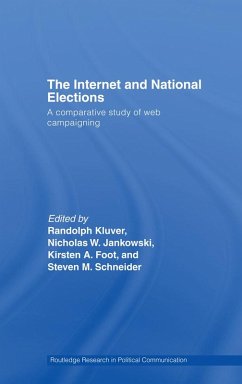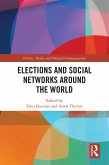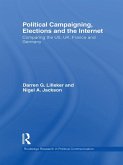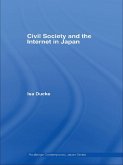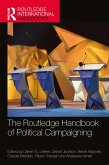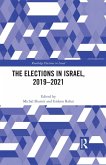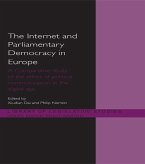The Internet and National Elections (eBook, ePUB)
A Comparative Study of Web Campaigning
Redaktion: Kluver, Randolph; Schneider, Steven M.; Foot, Kirsten; Jankowski, Nicholas
31,95 €
31,95 €
inkl. MwSt.
Sofort per Download lieferbar

16 °P sammeln
31,95 €
Als Download kaufen

31,95 €
inkl. MwSt.
Sofort per Download lieferbar

16 °P sammeln
Jetzt verschenken
Alle Infos zum eBook verschenken
31,95 €
inkl. MwSt.
Sofort per Download lieferbar
Alle Infos zum eBook verschenken

16 °P sammeln
The Internet and National Elections (eBook, ePUB)
A Comparative Study of Web Campaigning
Redaktion: Kluver, Randolph; Schneider, Steven M.; Foot, Kirsten; Jankowski, Nicholas
- Format: ePub
- Merkliste
- Auf die Merkliste
- Bewerten Bewerten
- Teilen
- Produkt teilen
- Produkterinnerung
- Produkterinnerung

Bitte loggen Sie sich zunächst in Ihr Kundenkonto ein oder registrieren Sie sich bei
bücher.de, um das eBook-Abo tolino select nutzen zu können.
Hier können Sie sich einloggen
Hier können Sie sich einloggen
Sie sind bereits eingeloggt. Klicken Sie auf 2. tolino select Abo, um fortzufahren.

Bitte loggen Sie sich zunächst in Ihr Kundenkonto ein oder registrieren Sie sich bei bücher.de, um das eBook-Abo tolino select nutzen zu können.
This volume represents an important contribution towards gaining a cross-national understanding of the current and emerging impacts of the Internet on political practice.
- Geräte: eReader
- mit Kopierschutz
- eBook Hilfe
- Größe: 0.46MB
Andere Kunden interessierten sich auch für
![Elections and Social Networks around the World (eBook, ePUB) Elections and Social Networks around the World (eBook, ePUB)]() Elections and Social Networks around the World (eBook, ePUB)41,95 €
Elections and Social Networks around the World (eBook, ePUB)41,95 €![Political Campaigning, Elections and the Internet (eBook, ePUB) Political Campaigning, Elections and the Internet (eBook, ePUB)]() Darren LillekerPolitical Campaigning, Elections and the Internet (eBook, ePUB)41,95 €
Darren LillekerPolitical Campaigning, Elections and the Internet (eBook, ePUB)41,95 €![Civil Society and the Internet in Japan (eBook, ePUB) Civil Society and the Internet in Japan (eBook, ePUB)]() Isa DuckeCivil Society and the Internet in Japan (eBook, ePUB)37,95 €
Isa DuckeCivil Society and the Internet in Japan (eBook, ePUB)37,95 €![The Routledge Handbook of Political Campaigning (eBook, ePUB) The Routledge Handbook of Political Campaigning (eBook, ePUB)]() The Routledge Handbook of Political Campaigning (eBook, ePUB)45,95 €
The Routledge Handbook of Political Campaigning (eBook, ePUB)45,95 €![Elections and Democratization in the Philippines (eBook, ePUB) Elections and Democratization in the Philippines (eBook, ePUB)]() Jennifer FrancoElections and Democratization in the Philippines (eBook, ePUB)47,95 €
Jennifer FrancoElections and Democratization in the Philippines (eBook, ePUB)47,95 €![The Elections in Israel, 2019-2021 (eBook, ePUB) The Elections in Israel, 2019-2021 (eBook, ePUB)]() The Elections in Israel, 2019-2021 (eBook, ePUB)41,95 €
The Elections in Israel, 2019-2021 (eBook, ePUB)41,95 €![The Internet and European Parliamentary Democracy (eBook, ePUB) The Internet and European Parliamentary Democracy (eBook, ePUB)]() The Internet and European Parliamentary Democracy (eBook, ePUB)41,95 €
The Internet and European Parliamentary Democracy (eBook, ePUB)41,95 €-
-
-
This volume represents an important contribution towards gaining a cross-national understanding of the current and emerging impacts of the Internet on political practice.
Dieser Download kann aus rechtlichen Gründen nur mit Rechnungsadresse in A, B, BG, CY, CZ, D, DK, EW, E, FIN, F, GR, HR, H, IRL, I, LT, L, LR, M, NL, PL, P, R, S, SLO, SK ausgeliefert werden.
Produktdetails
- Produktdetails
- Verlag: Taylor & Francis eBooks
- Seitenzahl: 304
- Erscheinungstermin: 7. Mai 2007
- Englisch
- ISBN-13: 9781134114627
- Artikelnr.: 38251075
- Verlag: Taylor & Francis eBooks
- Seitenzahl: 304
- Erscheinungstermin: 7. Mai 2007
- Englisch
- ISBN-13: 9781134114627
- Artikelnr.: 38251075
- Herstellerkennzeichnung Die Herstellerinformationen sind derzeit nicht verfügbar.
Randolph Kluver, Nicholas Jankowski, Kirsten Foot, Steven M. Schneider
Section 1: Conceptualizing and Designing the Project 1. Introducing the
Internet and Elections Project 2. The Internet and Elections Project
Research Design Section 2: Political Actors as Web Producers 3. Finland:
The European Parliament Election in a Candidate-Centered Electoral System
4. The Netherlands: Party and Candidate Web Sites during the 2004 European
Parliament Election Campaign 5. Slovenian Online Campaigning during the
2004 European Parliament Election: Struggling Between Self-promotion and
Mobilization 6. The Consequence of e-Excellence: Party Web Sites in the
Czech Campaign for the 2004 European Parliament 7. Online Structure for
Political Action in the 2004 U.S. Congressional Electoral Web Sphere
Section 3: Reaching Diverse Constituencies Via the Web 8. Philippines:
Poli-Clicking as Politicking. Online Campaigning and Civic Action in the
2004 National Election 9. The Internet in the 2004 Sri Lankan Elections
10. Addressing Young People Online: The 2004 European Parliament Election
Campaign and Political Youth Web Sites 11. Two Indias: The Role of the
Internet in the 2004 National Elections Section 4: Political Culture and
the Diffusion of Technologies 12. Web-based Citizen Engagement in the 2004
Australian Federal Election 13. Hungary: Political Strategies and Citizen
Tactics in the 2004 European Parliament Elections 14. Internet Deployment
in the 2004 Indonesian Presidential Elections 15. Roles and Regulations:
Boundaries on the Japanese Web Sphere in the 2004 Upper House Election 16.
Web Sphere Analysis for Political Web Sites: The 2004 National Assembly
Election in South Korea Section 5: Comparisons and Conclusions 17.
Comparing Web Production Practices across Electoral Web Spheres 18. Project
Conclusions and Proposals for Continued Research
Internet and Elections Project 2. The Internet and Elections Project
Research Design Section 2: Political Actors as Web Producers 3. Finland:
The European Parliament Election in a Candidate-Centered Electoral System
4. The Netherlands: Party and Candidate Web Sites during the 2004 European
Parliament Election Campaign 5. Slovenian Online Campaigning during the
2004 European Parliament Election: Struggling Between Self-promotion and
Mobilization 6. The Consequence of e-Excellence: Party Web Sites in the
Czech Campaign for the 2004 European Parliament 7. Online Structure for
Political Action in the 2004 U.S. Congressional Electoral Web Sphere
Section 3: Reaching Diverse Constituencies Via the Web 8. Philippines:
Poli-Clicking as Politicking. Online Campaigning and Civic Action in the
2004 National Election 9. The Internet in the 2004 Sri Lankan Elections
10. Addressing Young People Online: The 2004 European Parliament Election
Campaign and Political Youth Web Sites 11. Two Indias: The Role of the
Internet in the 2004 National Elections Section 4: Political Culture and
the Diffusion of Technologies 12. Web-based Citizen Engagement in the 2004
Australian Federal Election 13. Hungary: Political Strategies and Citizen
Tactics in the 2004 European Parliament Elections 14. Internet Deployment
in the 2004 Indonesian Presidential Elections 15. Roles and Regulations:
Boundaries on the Japanese Web Sphere in the 2004 Upper House Election 16.
Web Sphere Analysis for Political Web Sites: The 2004 National Assembly
Election in South Korea Section 5: Comparisons and Conclusions 17.
Comparing Web Production Practices across Electoral Web Spheres 18. Project
Conclusions and Proposals for Continued Research
Section 1: Conceptualizing and Designing the Project 1. Introducing the
Internet and Elections Project 2. The Internet and Elections Project
Research Design Section 2: Political Actors as Web Producers 3. Finland:
The European Parliament Election in a Candidate-Centered Electoral System
4. The Netherlands: Party and Candidate Web Sites during the 2004 European
Parliament Election Campaign 5. Slovenian Online Campaigning during the
2004 European Parliament Election: Struggling Between Self-promotion and
Mobilization 6. The Consequence of e-Excellence: Party Web Sites in the
Czech Campaign for the 2004 European Parliament 7. Online Structure for
Political Action in the 2004 U.S. Congressional Electoral Web Sphere
Section 3: Reaching Diverse Constituencies Via the Web 8. Philippines:
Poli-Clicking as Politicking. Online Campaigning and Civic Action in the
2004 National Election 9. The Internet in the 2004 Sri Lankan Elections
10. Addressing Young People Online: The 2004 European Parliament Election
Campaign and Political Youth Web Sites 11. Two Indias: The Role of the
Internet in the 2004 National Elections Section 4: Political Culture and
the Diffusion of Technologies 12. Web-based Citizen Engagement in the 2004
Australian Federal Election 13. Hungary: Political Strategies and Citizen
Tactics in the 2004 European Parliament Elections 14. Internet Deployment
in the 2004 Indonesian Presidential Elections 15. Roles and Regulations:
Boundaries on the Japanese Web Sphere in the 2004 Upper House Election 16.
Web Sphere Analysis for Political Web Sites: The 2004 National Assembly
Election in South Korea Section 5: Comparisons and Conclusions 17.
Comparing Web Production Practices across Electoral Web Spheres 18. Project
Conclusions and Proposals for Continued Research
Internet and Elections Project 2. The Internet and Elections Project
Research Design Section 2: Political Actors as Web Producers 3. Finland:
The European Parliament Election in a Candidate-Centered Electoral System
4. The Netherlands: Party and Candidate Web Sites during the 2004 European
Parliament Election Campaign 5. Slovenian Online Campaigning during the
2004 European Parliament Election: Struggling Between Self-promotion and
Mobilization 6. The Consequence of e-Excellence: Party Web Sites in the
Czech Campaign for the 2004 European Parliament 7. Online Structure for
Political Action in the 2004 U.S. Congressional Electoral Web Sphere
Section 3: Reaching Diverse Constituencies Via the Web 8. Philippines:
Poli-Clicking as Politicking. Online Campaigning and Civic Action in the
2004 National Election 9. The Internet in the 2004 Sri Lankan Elections
10. Addressing Young People Online: The 2004 European Parliament Election
Campaign and Political Youth Web Sites 11. Two Indias: The Role of the
Internet in the 2004 National Elections Section 4: Political Culture and
the Diffusion of Technologies 12. Web-based Citizen Engagement in the 2004
Australian Federal Election 13. Hungary: Political Strategies and Citizen
Tactics in the 2004 European Parliament Elections 14. Internet Deployment
in the 2004 Indonesian Presidential Elections 15. Roles and Regulations:
Boundaries on the Japanese Web Sphere in the 2004 Upper House Election 16.
Web Sphere Analysis for Political Web Sites: The 2004 National Assembly
Election in South Korea Section 5: Comparisons and Conclusions 17.
Comparing Web Production Practices across Electoral Web Spheres 18. Project
Conclusions and Proposals for Continued Research
